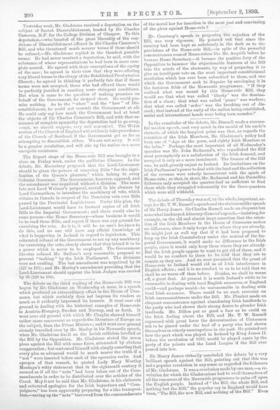The debate of Thursday was not on the whole, important,
ex- cept for Mr. T. W. Russell's speech and the statesmanlike speech, of Sir Henry James. Sir Charles Russell made an eloquent but somewhat hackneyed Attorney-General's speech,—insisting, for example, on the old and almost inept assertion that the reten- tion of the Irish Members in the House of Commons makes no difference, since it only keeps them where they are already. He might just as well say that if it had been proposed to- keep up the Irish Constabulary under the control of the Im- perial Government, it would make no difference to the Irish people, since it would only keep them where they are already. But the Irish people appear to want to get rid of them, and it would be no comfort to them to be told that they are to- remain as they are. And we were promised that the grant of Home-rule to Ireland would rid us of Irish interference in English affairs ; and it is no comfort to us to be told that we shall be no worse off than before. Besides, we shall be worse off, a great deal. At present it is worth Ireland's while to be- reasonable in dealing with local English measures, or England could—and perhaps would—be unreasonable in dealing with local Irish measures. There would be no such restraint on Irish unreasonableness under the Bill. Mr. Plunket made an eloquent remonstrance against abandoning Irish landlords to the party who had shown their strong desire to plunder Irish landlords. Mr. Dillon put as good a face as he could on the Irish feeling about the Bill, and Mr. T. W. Russell expressed with great force the determination of Ulstermen not to be placed under the heel of a party who had shown themselves so utterly unscrupulous in the past. He pointed out. how the part which was played in Ireland by King James IL before the revolution of 1688, would be played again by the. party of the priests and the Land League if the Bill ever passed into law.


































 Previous page
Previous page